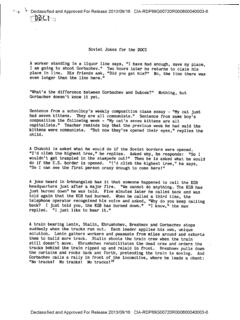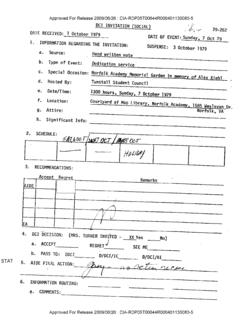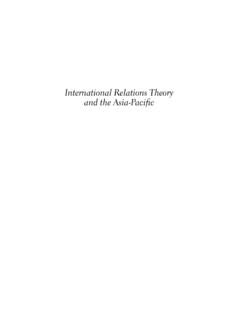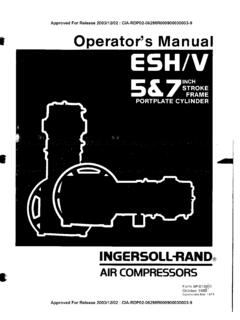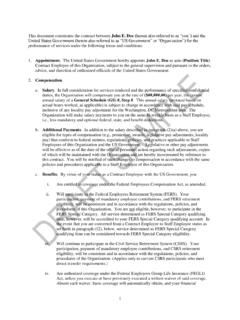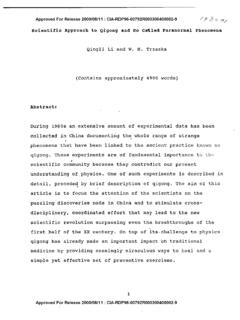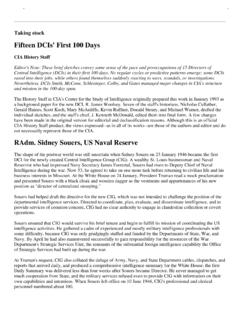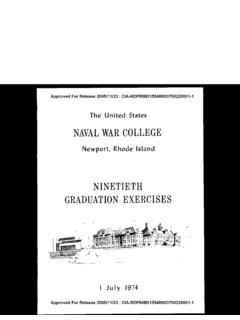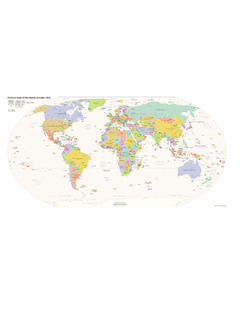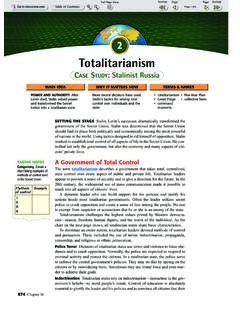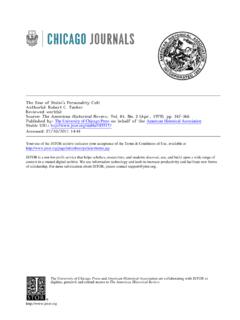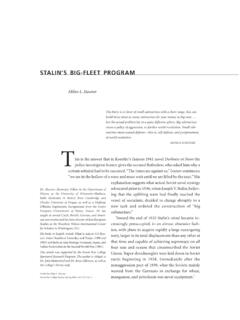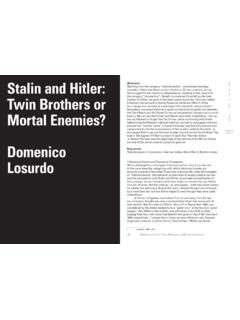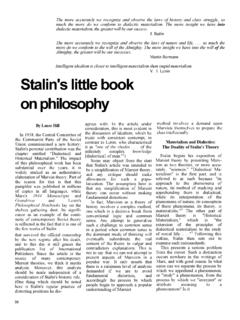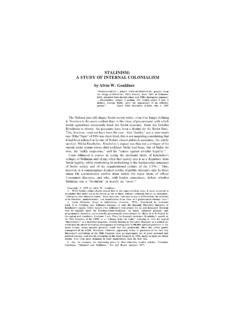Transcription of -2- - Central Intelligence Agency
1 - .. - - - - .. ". PI..I* DEATH OF STALIN LAST DAYS OF STALIN This then was the situation in the Soviet Union on 4 March, when Radio Moscow announced that Stalin was in critical condition as a re- sult of a stroke on the night of 1-2 March. bulletins were couched in pessimistic te'rms. They carefully outlined tbe nature of Stalin'r, illness and meticulously described the measures being taken by the 'doctors who were treating him. These play-by-play accounts revealed concern lest listeners 'interpret this news; as mean- 'ing that either the old "doctor wreckers," or a group of new ones, 4ad succeeded in shortening Stalin's life.
2 'The eight doctorb in at- tendance'were under the supervision of a new Minister of Health, Tretyakov. The continuing medical Stalln had been last seen by a non-Communist on 17 February when he had given an audience to the Indian Ambassador (who had, however, never met him previouslyj. While it is possible that Stalln'e Illness had been carefully concealed, and that a double was used for this In- terview, this is unlikely; it is considered highly doubtful that a double would have been uaed for Stalin's last interview. Stalin's collapse actuaUy followed several month8 of what for him was unusual activity. Work on the Party Congress had evidently kept him in Moscow throughout the fall; in addition to this, he had granted at least four interviews to foreigners, the anniversary ceremonies on 7 November and had appeared in the Bolshoi theatre on 12 January.)
3 (It is true, however, that Stalin's movements had been somewhat restricted. He delivered only a short speech at the Party Congress, yielding the main @dress to MalexQcov. shorter than usual, probably out of deference to him. ) The 7 November ceremonies had been much ..,..,__ .,.; ~ .. The nature of the reporting on Stalin's illness suggesFed that his final stroke caught the Politburo off gusrd. There had been no advance xaming. An examination of all Soviet radio propaganda from 1 to 4 March yielded no ind$cation prior to the public anaouncement of Stalin's actual There were'no significant differences either in the nature ,or in the number of references to Stalln, who continued to be presented during this period a8 the focus of power in the Soviet Union.
4 Similarly, an all the 'SateUte radio propaganda material from'the time of the October Party Congress to Stalin's no attempt to build up any of his lieuten- ants in possible anticipation of his voluntary or involuntary relin- quishment of power. -1- I This informetion is of course far from'conclusive. Many hypoth- eses concerning the circumstances of Stalin's death Could be advanced to explain this lack of preparation. Furthennore, the West was com- pletely dependent on the Soviet radio and pres6 for all'newa on this .development. It is imposqlble therefore to determine whether Sun had been dead for some time, whether he was murdered, or died in the way the medical bulletins said he did.
5 TBE QUESTION OF ,STALIX'S SUCCESSOR The announcements regarding Stalin's condition, ind they did that the Soviet Union would soon be without its eether he cating as leader and revking that Stalln's di8ciples had waited four &ye before inform- ing the people of their iIifpenaing'los8, innnediately focused attention on Mslenkov as the most likely succes~or. forward since Zhdanov's death in Auguet 1948. of the Party Secretariat, the position from which Stalin originally consolideted hie power. a member of all three of the highest, bodies of the Party and Government-- the Politburo, the SecreFiat, and the ColleAium of the Council of Ministers (Deputy Chairmen).
6 I His career had moved steadily He vab the senior member He was the only man other than Stalin who was I I Ignatiev's appointment in 1951- M3B Minister va8 also thought to have had the blessing and approval of Malenkov. Ignatiev's Party career indicated that he had prospered under, and had possibly been brought along by, Malenkov. Moreover, one curious bit of biographic information suggested that their association may have been of long standing. KOmeomol member, wa8 directed to the political section of the Ebkhara Oblast and in the following year he was transferred to the military section of the All-Bukhara Extraordinary Commiesion.
7 Serving as a "polltical wbrker" in the military-political administra- tion in the Bukhara region at about this time. The nature of In 1920 Ignatiev, 16 years old and a Malenkov vas .. -2- .:.. Malenkov had delivered. the key address at the Party Congress, and subsequently, as might have been expected, it had been accorded much publicity throughout the Communist world. The replacemen!of the Pout- bur0 by a Presidium, the composition of which apparently favored Wen- kov if it favored any of the old Politburo memoers, also seemed to con- tribute to his leading position. Secretariat. This was even more true of the enlarged Thus it was commonly expected that Malenkov would attempt to fill the void left by Stalin.
8 The official announcement regarding Stalin's illness, however, threw no light on the subject of hi8 successor. It merely placed responsibility in the Central Committee of the Pey and in the Council of Ministers, claiming that these two bodies would "take into account all circumstances connected with the temporary withdrawal of Stalin from leading +he State's and Party's activity." The announcement of '6 death ca!ne on 5 March. It linked his name with that of Lenin in an eulogy of the Party as leader of the people. It underscored -the "steel-like, monolithic unity" of Party ranks and defined its task 8s the "guarding of unity'; as the "apple of our eye.
9 'I Reuters a% the time recalled that Malenkov used this phrase in his October Party Congress speech and suggested that he was the author of the document. The same phrase, however, had appeared in connection with Lenin's death. Neither Malenkov nor any other as- sociate of Sta3in was mentioned in the announcement. Malenkov had come before the public eye, however, in a 4 March Pravda editorial which quotes from the section of hie Congress speech dealing with Party unity. The announcement affirmed the Soviet Union's peaceful intentions and desire for l'business-like" relatiow. people" flret on the list of those people witu whom the Soviet Union intended to develop friendship.
10 It named the "great Chinese Khrzlshchev was listed as chairman of the Committee for organizing On it were Kaganovich, Shvernik, Vasilevsky, Eegov, The funeral StaUn's funeral-. Artemev, the c0-t of the Moacow Military District, and Yasnov, Chairman of the Executive Committee of the Moscow Soviet. ritea were set for 9 March. -3- J , .. ,.. _.. __-_ THE FIRST GOvERmMENTAL REORGAIVIZATIOIV On 7 March, Moscow radio announced that in order to prevent "panic and disarray," a major reorganization of the Party and Govern- ment had been made at a joint meeting of the Central Committee, the Council of Ministers and the Presidium of the Supreme Soviet.
